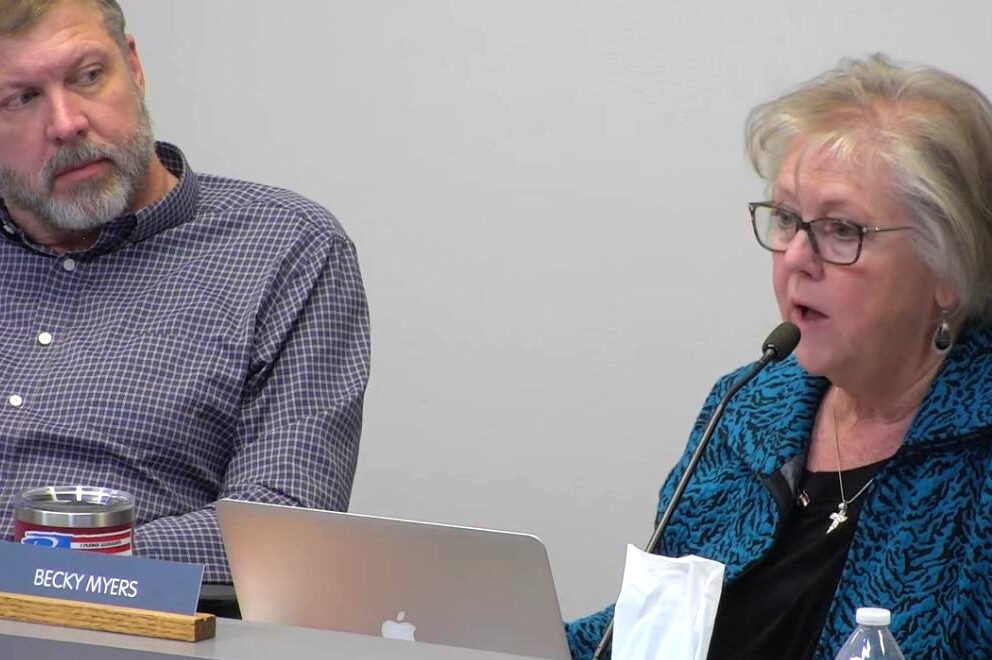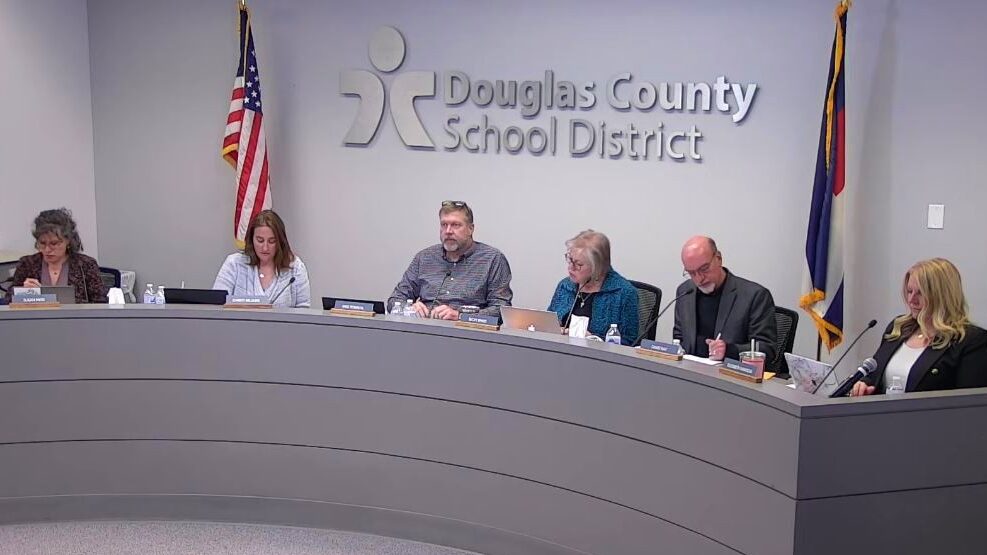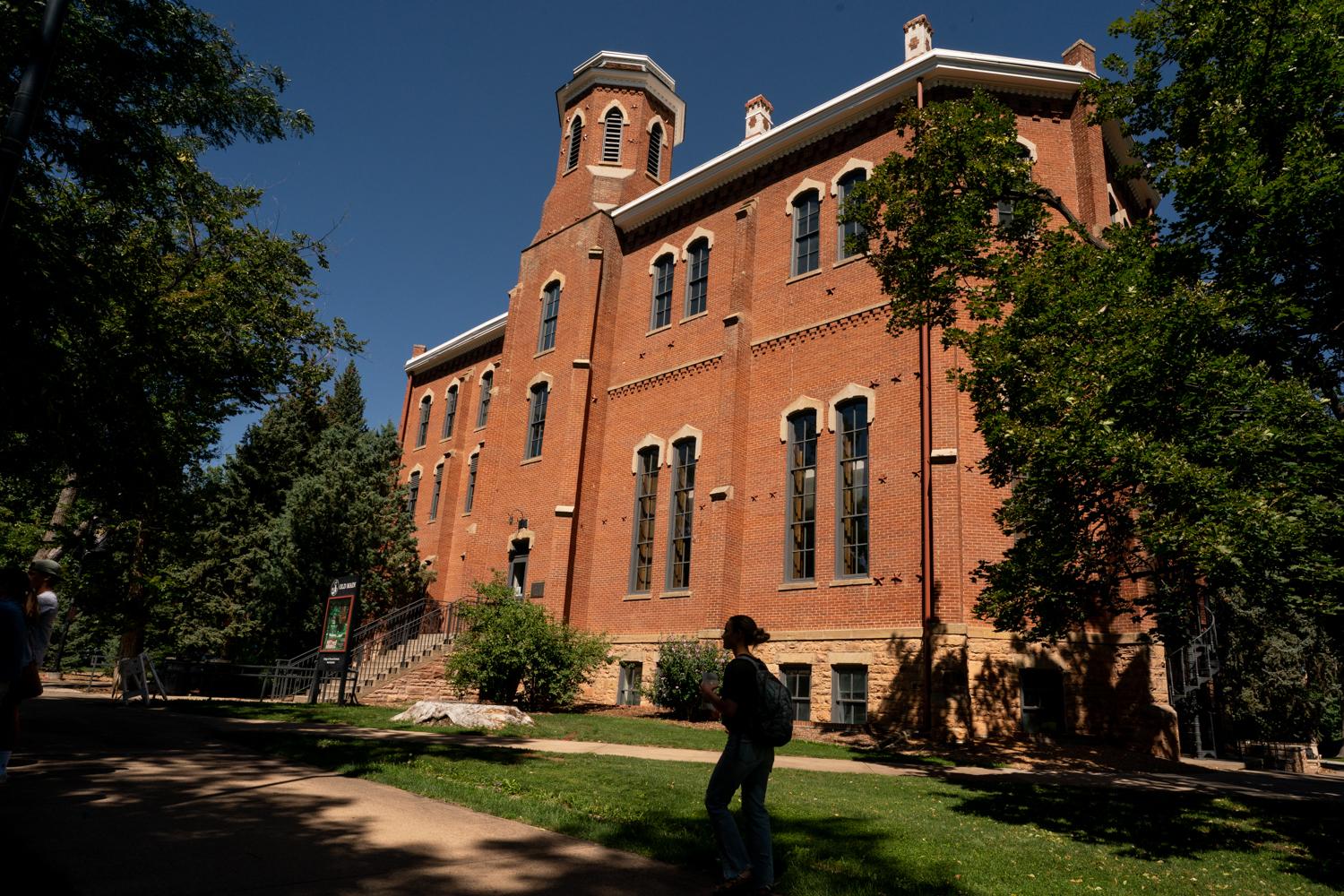
The Douglas County school board voted 4 to 3 Tuesday night to hire charter school leader Erin Kane as the district’s next superintendent after weeks of upheaval rattled the state’s third largest school district.
Kane, the executive director of schools for American Academy, a charter public school in the Douglas County School District, was one of two finalists for the district’s top job. She previously served as the district’s interim superintendent from 2016 to 2018.
A second candidate, backed by many of the district’s teachers, was Danny Winsor, a longtime district administrator and former teacher and principal. The vote to select Kane capped off a seven-hour board meeting that included more than two hours of public comment.
Kane will have to unify a deeply divided district after the school board's conservative majority voted to terminate former Superintendent Corey Wise’s contract in February.
Wise’s ouster fueled turmoil in the community after allegations surfaced that the decision to fire him was reached in secret. More than 1,500 teachers called in sick as part of a protest that closed schools, and some students later walked out of their classes.
The board’s conservative majority backed Kane, who addressed the board after the vote.
“The distance between us is not anywhere near as much as you would be led to believe,” said Kane. “If we all work together to listen to each other, understand each other's concerns… I would be privileged to lead bridging that divide.”

Board president Mike Peterson said the district’s top priority is reestablishing the partnership between parents and teachers. He said he believes Kane is someone who can can give teachers a voice but who also “understands that the parent has the primary role in the raising of their child, whether it is health decisions, whether it's decisions around curriculum, what to opt into, what to opt out of and to always put academic growth and achievement as the north star of this district.”
All the board members said both candidates had excellent qualifications, but the three members of the minority said Winsor was the candidate who could restore trust most quickly.
“Selecting Danny, to me, symbolizes and signals a desire to find common ground, to restore trust and to place the students or place the place, the focus on our students and not us,” said board member David Ray. He said the district received about 1,300 comments from a community forum; 22 percent had favorable responses for Kane while 97 percent had favorable responses for Winsor.
Board member Susan Meek asked the four majority members whether they had a conflict of interest prior to voting. She cited Kane's attendance at a private retreat the four majority members attended prior to assuming office. Kane also made campaign contributions to each of the four, and board president Mike Peterson is said to have asked Kane if she would be interested in the superintendent job prior to Wise’s removal.
Some board members disputed seeing a conflict or declined to comment.
Dozens of people who gave comments spoke out to support Kane, noting her background in data science, a track record of building relationships and the fact that she kept her charter school open during the pandemic.
They said despite differing opinions, Kane got high marks for her pandemic response from both teachers and parents. Others argued she is well-versed in district financials and academics, and cited Kane's prior work in advocating for the mill levy override in 2018.
"She is most prepared to help pass the bond for Douglas County School," said resident Tricia Ackerman. "I believe Erin Kane will be able to bring our community back together."
Resident Robin Webb also favored Kane as superintendent. She pointed to Kane's tenure as interim superintendent from 2016-2018, crediting her with stemming the flow of teachers and administrators leaving the district.
"She wants parents to have a place at the table. Enough said."
Others accused the board's majority of backing Kane as a way to show public charter schools preference over district-run neighborhood schools. Mathew Solak said it was evident the decision to hire Kane was made a long time ago. He urged the board to hire Danny Winsor, who he said would “do what is best for students."
"Why are you so set to hire a charter school administrator to run a public school district?"
Dozens of teachers expressed concern that Kane will further divide the community and ignore their input. Most of their statements were read by other people, who said the teachers feared retaliation.
There is a huge sense of anxiety among many educators who remember an earlier era in Douglas County school board politics. There were issues with transparency and fiscal responsibility and ultimately an academic decline in the district. Beginning in 2009, a school board majority with a “reform” agenda instituted a now-defunct voucher program and an unpopular performance-based teacher pay plan. Nearly 18 percent of teachers left the district in 2014.
Teacher Jane Batt said past experience as a principal and teacher gives potential leaders the ability to make changes thoughtfully.
“One will never understand the pressures, challenges, the chaos and joys of teaching unless they themselves are in it with the teachers in the building day in and day out. Because of this Danny Winsor understands what education looks like and feels like on both great days and hard days.”
The 7-hour meeting didn’t end with the vote on a new superintendent. There was also the matter of whether to appeal a court decision on transparency.
After a Douglas County resident filed a lawsuit to challenge how the board decided on firing Wise, a district court ordered the board majority to follow the state’s open meetings law.
The judge ruled that the evidence indicated that the four board members broke the purpose of the law when they “collectively committed, outside of public meetings, to the termination of (Superintendent Corey) Wise’s employment.”
He ordered the four new board members not to meet in secret or discuss public business or take formal action by three or more members of the board – either as a group or by relaying information from one person to the next. Doing so would be in violation of Colorado’s open meetings law, which says public policy must be formulated in public.

At a March special board meeting, director Becky Myers said she didn’t understand the scope of the preliminary injunction order. Other directors also appeared confused about the order’s scope and meaning.
Steve Zansberg, an attorney for the plaintiff in the case and one of the state’s experts on Colorado’s Sunshine laws, offered to present his perspective on what the injunction prohibits and answer any questions at no cost. Myers replied to a community member’s email encouraging the board to accept Zansberg’s offer prior to engaging in a costly appeal.
“At this time, I will not be considering the offer for training, but thank you for your concern,” wrote Myers.
The board majority voted Tuesday night to hire an additional law firm to represent the school board so as to offer a “wider perspective” on the matter. The firm is Gessler Blue Law, the law firm of former secretary of state Scott Gessler, who also lost a bid to become chair of the Colorado Republican Party.
On the resolution about asking for a time extension to consider appealing the preliminary injunction, the three minority board members strongly voiced their opposition.
Susan Meek said those who wish to appeal can instead work with legislators to clarify or change the open meetings law “but do it on your dime, not the taxpayer dime.”
“Wasting Douglas County tax payer money on an appeal to try to prove that it is okay to have daisy chain conversations (two people at a time) with three or more board members to discuss and make public policy decisions outside of public meetings is simply ludicrous. And I think it's a violation of our fiduciary duty.”
“I do not think we need to spend taxpayer money to clarify anything in this judge’s order,” added board member Elizabeth Hanson, an attorney.
Board president Mike Peterson pushed back, though he did vote to leave open the possibility of a consent decree, a form of settling a dispute.
“What I’m concerned with is (having a) competent, diverse law firm getting this case right, and just honoring and understanding what is Colorado law and what is not Colorado law and I believe that to be absolutely in the best interest of this district and this board,” he said.
“It’s the plaintiff that’s wasting our resources,” board member Kaylee Winegar remarked.
The vast majority of people testifying Tuesday night disagreed with Winegar’s assessment, asking the board to not appeal the judge’s open meetings decision.
Teacher Laura Allen asked the board to consider how much an appeal would cost the district. She said any principal in the district would be excited to use the $300-400 per hour it will cost the district in lawyers’ fees to help a child grow academically. She asked the board to consider one question:
"Is fighting and appealing this really in the best interest of kids – is that really how we can best support them academically?... I think that will help guide your answer."








